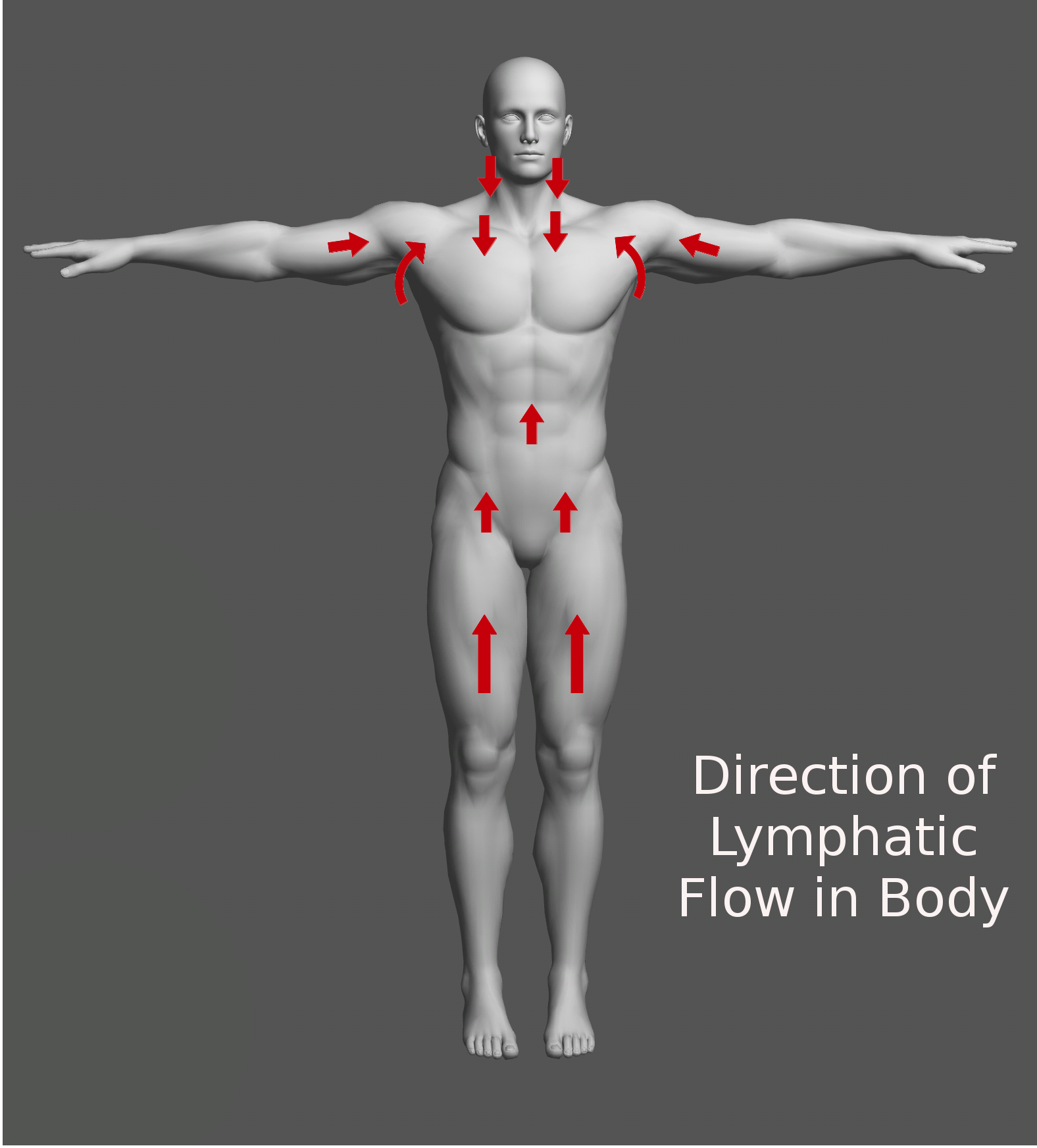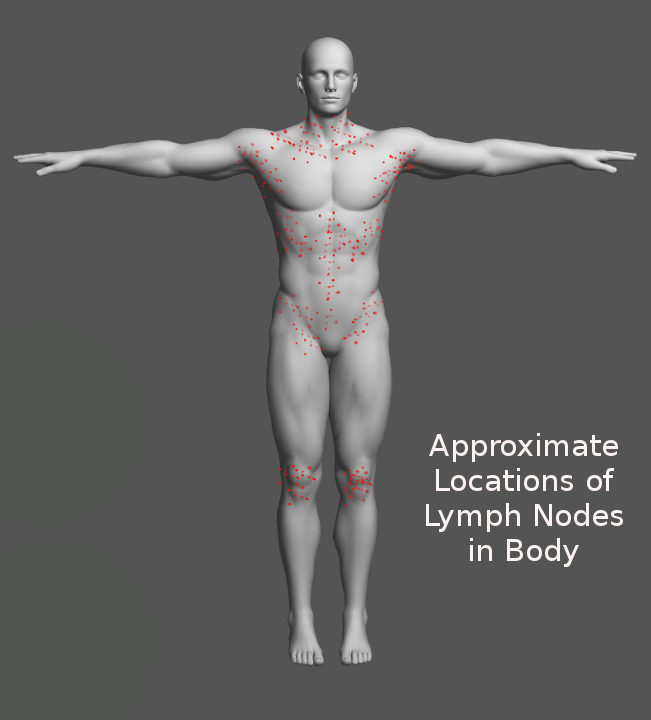I've spoken with a number of clients recently about lymphatic drainage. There seems to be quite a bit of misinformation about this treatment, so I wanted to provide a few frequently asked questions and answers, backed with credible resources. I hope that this post will answer all your questions, but if you have any more, please feel free email me directly.
Q: What is the lymphatic system and how does lymph work in the body?
A: "The blood and lymphatic systems are the two major circulatory systems in our body... The lymphatic system is a linear network of lymphatic vessels and secondary lymphoid organs. The lymphatic system is a blunt-ended linear system, in which tissue fluids, cells, and large extracellular molecules, collectively called lymph, are drained into the initial lymphatic capillary vessels that begin at the interstitial spaces of tissues and organs; are transported to thicker collecting lymphatics, which are embedded with multiple lymph nodes; and are eventually returned to the blood circulation through the thoracic or lymphatic ducts that join to the subclavian veins."1
"The principal physiological function of the lymphatic vasculature is to take up fluid, leaking out of blood capillaries into interstitial spaces in the tissue, and to return it to the blood circulation. Any failure to effectively do so results in lymphedema, a chronic, disabling and disfiguring condition." 2

"In addition to the tissue fluid homeostasis, the lymphatic system serves as a conduit for trafficking of lymphocytes and antigen-presenting cells to regional lymph nodes, where the immune system encounters pathogens, microbes, and other immune elicitors." 1
"When interstitial pressure increases, the anchoring filaments are operated to pull the cells and open up the overlapping junctions (or flaps), which allows the lymph fluids to drain into lymphatic capillaries for recirculation."1 THIS IS LYMPHATIC DRAINAGE. That mechanical force on the lymph to "drain it." Due to the implicit weakness in the lymphatic system, manually draining it can be beneficial to a degree for general health, but especially so after surgery, when those vessels are physically severed.
Put simply, the above quotes tell us that lymph is a fluid that flows throughout the body, like blood. Unlike blood, though, which is limited to arteries, veins and capillaries, lymph flows through "interstitial" spaces - that is, spaces in the body where nothing else is present. Kind of the "empty spaces" our bodies are full of. The reason lymph flows freely this way is because it's function is to move any foreign matter from one area of the body where it may enter to lymph nodes, where potential dangers are mitigated. For example, if you cut your ankle and dirt gets in to the cut, lymph is there to pull any dangerous substances to the lymph nodes, where it's cleaned and then circulated back throughout your body.
Q: Does that mean that lymphatic drainage will help "detox" my body?
A: "Detox" has become a bit of a buzzword lately, but the fact is, if there are "toxins" present in your body, they're filtered by your lungs, liver and kidneys. That includes any chemicals, viruses or bacteria you may either ingest or inhale. While it is the job of the lymph nodes to filter, lymphatic drainage really can't affect the job of the lymph nodes, as long as they're not compromised in some way. "Lymph nodes are filtration and purification stations for the lymph. In the nodes, specific immune cells destroy foreign or unwanted substances which can then easily be handled by the liver, and flushed out of the organs of elimination: the urinary tract, digestive apparatus, skin and lungs." [Chikly, Silent Waves, 2nd Ed. 2011, p. 46]
There's a theory lately that we may feel crummy from a buildup of either food-related or environmental toxins in our bodies. If your liver, kidneys or lungs are compromised, that COULD be true, but for the vast majority of us, it's just not. So lymphatic drainage will not "move toxins out of the body" or "reduce inflammation." If you feel sluggish after eating certain foods, that's valid, but it's completely unrelated to the lymphatic system.
Q: Will lymphatic drainage reduce the look of inflammation, puffiness or cellulite in my body?
A: I WISH! If there was a type of massage therapy that could reduce fat or inflammation, I'd be a Size 2. Again, we may feel a little puffy after eating certain foods (alcohol and sugar are typical culprits, but gluten does this for some people too) but that has to do with the digestion process, and has nothing to do with "toxins" in the body or the lymphatic system moving them. Manual therapy of any kind cannot "move toxins" throughout the body.
Q: Will lymphatic drainage boost my energy levels?
A: Ideally, yes. Many people report sleeping very well after this treatment, and that, in turn, makes you feel more energetic. I also perform it on myself briefly almost every night, and I'm happy to report that I do feel it makes me sleep more soundly.

Q: Does that mean lymphatic drainage help me get over a cold more quickly?
A: No. In fact, if you're sick, your lymphatic system is already working overtime. There is no need to add extra stress to it during sickness. However, if you receive regular lymphatic drainage, and perform it on yourself, you may notice that you get sick less frequently and less intensely, as has been my experience. Lymph moves in the body as the body moves; that is, if you lead an active lifestyle with plenty of exercise, your lymph should already be moving pretty well through your body. This treatment is certainly not a magic bullet to make up for otherwise unhealthy practices. You'll note, however, that the lymphatic drainage treatment is extremely relaxing. I've had many clients say they slept more soundly after this light treatment than deep tissue work!
Q: Should I have lymphatic drainage performed after surgery?
A: Yes. Especially if that surgery was performed anywhere in your abdomen. Of course, clear any work with your medical professional beforehand. "The association between manual lymphatic drainage and the therapeutic ultrasound reduced the swelling and the tissue fibrosis and made pain disappear in liposuction and lipoabdominoplasty."3 "MLD [manual lymph drainage] can be an alternative or a supplementary procedure for patients surgically treated."4
Q: Should that lymphatic drainage after surgery physically push fluid out of my body?
A: NO. It's alarming that I've heard a number of people say they've had "lymphatic drainage" performed while standing with someone physically pushing fluid out of their incisions. Not only is this medically dangerous, but it's out of the scope of practice for massage therapy, and more than that, is NOT ACTUAL LYMPHATIC DRAINAGE. Please, vet your surgeon and post-operative clinics before having this work performed. Lymph and other fluids should only ever stay in the body, and if fluid does come out of incisions, it's not actually lymph anyway, it's likely just water or plasma.
References
1 The New Era of the Lymphatic System: No Longer Secondary to the Blood Vascular System. Choi, et al., Department of Surgery, Department of Biochemistry and Molecular Biology, Norris Comprehensive Cancer Center, Keck School of Medicine, University of Southern California, Los Angeles, California, April 2012. https://www.ncbi.nlm.nih.gov/pmc/articles/PMC3312397/
2 The Lymphatic System in Health and Disease. Cueni and Detmar, Institute of Pharmaceutical Sciences, Swiss Federal Institute of Technology, ETH Zurich, Zurich, Switzerland. February 14, 2013. https://www.ncbi.nlm.nih.gov/pmc/articles/PMC3572233/
3 Manual lymphatic drainage and therapeutic ultrasound in liposuction and lipoabdominoplasty post-operative period. Masson, et al., Department of Physical Therapy, Universidade Paulista, São Paulo, Brazil., January 2014. https://www.ncbi.nlm.nih.gov/pubmed/24987208
4 Patients with venous disease benefit from manual lymphatic drainage. Moloski, et al., Department of Orthopaedic and Traumatology, Nicolaus Copernicus University, Collegium Medicum in Bydgoszcz, Poland., April 2009. https://www.ncbi.nlm.nih.gov/pubmed/19367246
For further reading: Preventative measures for lymphedema: Separating fact from fiction. Cemal, et al., The Division of Plastic and Reconstructive Surgery, Department of Surgery, Memorial Sloan-Kettering Cancer Center, New York, NY, May 2013. https://www.ncbi.nlm.nih.gov/pmc/articles/PMC3652571/
Mechanical Forces and Lymphatic Transport. JW Breslin, Department of Molecular Pharmacology and Physiology, Morsani College of Medicine, University of South Florida, Tampa, FL, USA, November 2014. https://www.ncbi.nlm.nih.gov/pubmed/25107458